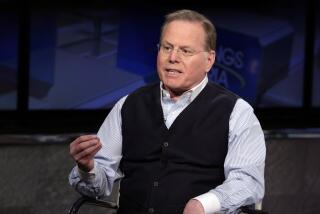Chief for AT&T; Equipment Firm Chosen : Telecom: Pick of ex-Cummins Engine CEO comes as surprise. Other appointments also offer glimpse of post-breakup giant.
- Share via
In a surprise move, AT&T; Corp. Chairman Robert E. Allen said Thursday that he had appointed the former head of the world’s largest diesel-engine maker to head up the new communications equipment company that AT&T; is spinning off as part of its recently announced breakup.
AT&T; said Henry Schacht, former chief executive of Cummins Engine, will become chairman and chief executive of the $20-billion equipment firm when it becomes independent next year.
Allen also announced that Alex Mandl, who joined AT&T; in 1991 as chief financial officer and now heads AT&T;’s core long-distance business, would become president and chief operating officer of the remaining phone company, AT&T; Corp., when the restructuring is completed.
Lars Nyberg will remain chairman and chief executive of the third company to result from the breakup, the computer division made up of the former NCR.
Thursday’s appointments offered the first hints of what the new breakaway companies might look like since AT&T;’s landmark Sept. 20 announcement that it will split itself into three companies. The breakup is intended to make AT&T; more responsive to fast-changing market conditions and to boost its languishing share price.
Coincidentally, AT&T;’s long-distance business, which will form the heart of the remaining AT&T; after the breakup is finalized, got a boost Thursday when the Federal Communications Commission announced, as expected, that the company is no longer the dominant player in the long-distance business, meaning it can now change its prices at will without a waiting period.
The appointment of Mandl, 51, who had been chief executive of shipping giant Sea-Land Service Inc. before joining AT&T;, had been anticipated. Mandl is widely regarded as Allen’s heir apparent.
But the appointment of the 60-year-old Schacht, who retired in February as chairman of Cummins and has been an AT&T; director since 1981, came as a surprise. Richard McGinn, the current head of AT&T;’s network systems division, will be chief operating officer, reporting to Schacht.
“We’re still digesting it,” said one employee at the equipment division.
Analysts say Schacht (pronounced “shocked”), who will assume his role early next year when the equipment company is formally broken off, faces some big challenges in leading the new company to prosperity.
On the one hand, the company will find its big telephone network switches easier to sell, since the regional Bell telephone companies and others that buy its products will no longer view it as a competitor. On the other hand, it will no longer have the benefit of subsidies from the far more profitable phone service side to support research at its Bell Laboratories.
And many of the businesses in which it will compete--including network equipment, consumer telephones, office telephone switches and wireless communications gear--are fiercely competitive and suffering from declining margins.
A. Michael Noll, a professor at the USC’s Annenberg School of Communication, estimates that the equipment company, accounted for separately, would have lost $2 billion on $20 billion in revenue last year.
“They are going to have to get costs under control drastically,” Noll said. “That means dumping a lot of people. It’s a job I wouldn’t want.”
Schacht has been through some tough times already.
As chief executive at Cummins, Schacht was one of the first old-line industrialists to mount an aggressive response to the Japanese challenge in the 1970s, earning himself the title “king of the Rust Belt.”
He benchmarked Cummins’ performance against Japanese competitors and introduced concepts such as just-in-time inventory management to slash costs and improve quality. When Japanese companies attacked with heavily discounted products, Schacht cut prices by 30%. When earnings suffered, Schacht imposed pay cuts, starting with a 15% cut in his own salary.
More to Read
Inside the business of entertainment
The Wide Shot brings you news, analysis and insights on everything from streaming wars to production — and what it all means for the future.
You may occasionally receive promotional content from the Los Angeles Times.








